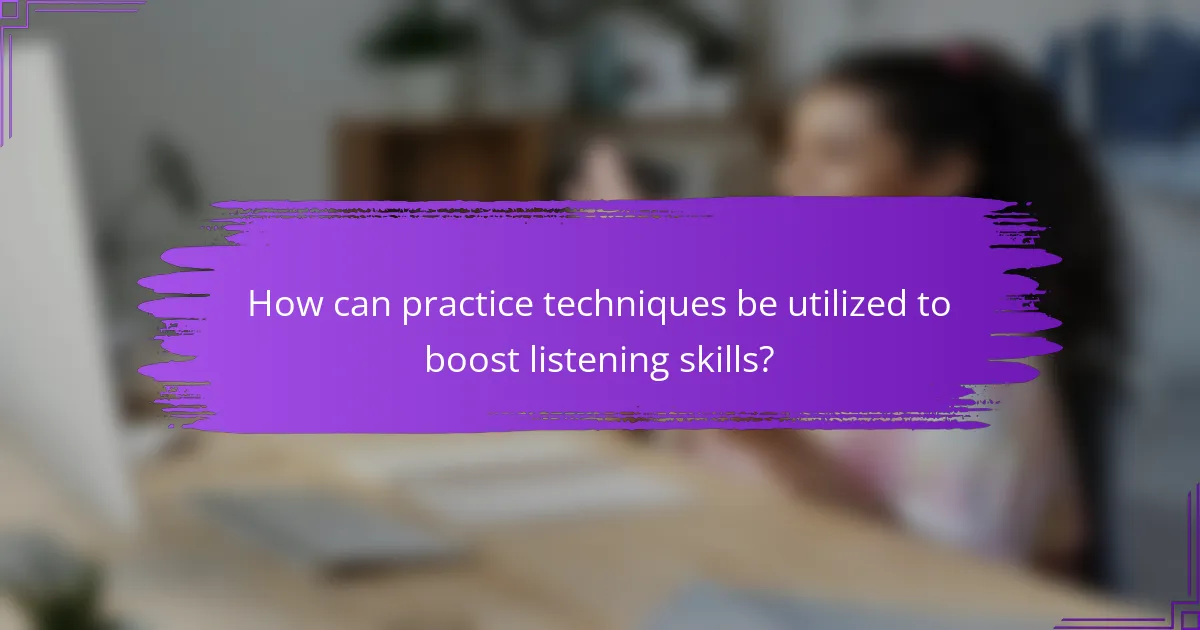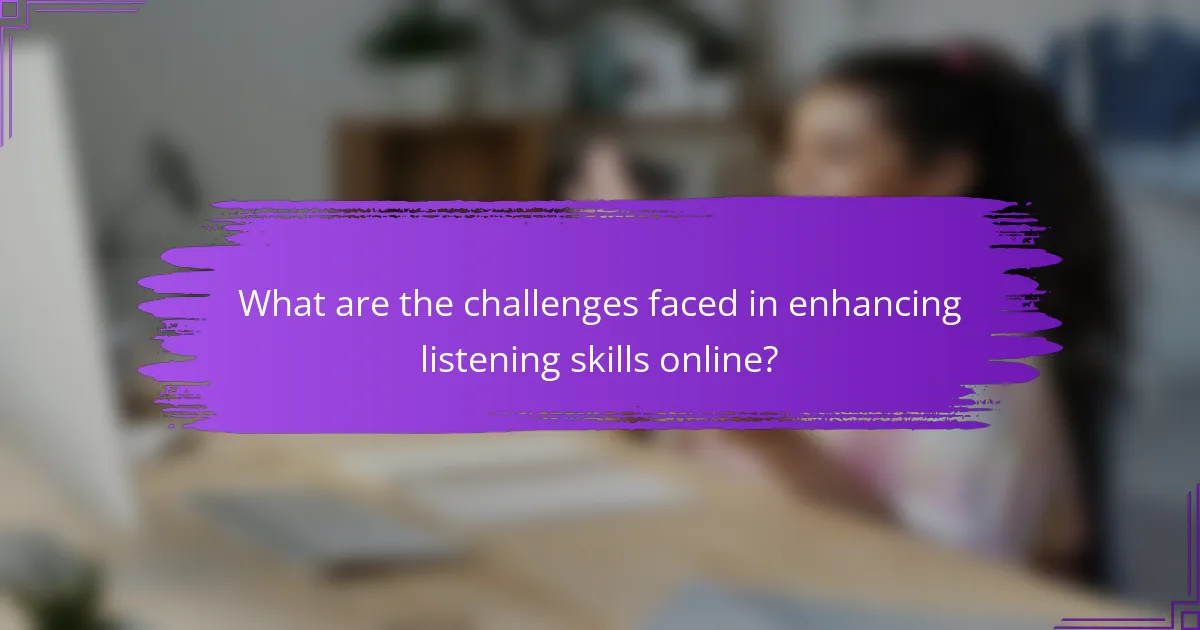
What are Effective Strategies for Enhancing Listening Skills in Online Japanese Education?
Effective strategies for enhancing listening skills in online Japanese education include using diverse audio resources, engaging in interactive activities, and consistent practice techniques. Audio resources such as podcasts, music, and audiobooks expose learners to different accents and vocabulary. Interactive activities like listening quizzes and games encourage active participation. Regular practice techniques, such as shadowing native speakers, help improve pronunciation and comprehension. Research shows that varied listening experiences significantly enhance language acquisition. For instance, a study by Vandergrift and Goh (2012) highlights the importance of extensive listening in developing listening skills.
How can audio resources improve listening skills in Japanese learning?
Audio resources can significantly enhance listening skills in Japanese learning. They provide authentic language exposure through native speaker pronunciation. This exposure helps learners develop an ear for the rhythm and intonation of the language. Listening to various audio formats, such as podcasts and dialogues, improves comprehension and vocabulary acquisition. Research shows that consistent audio practice leads to better understanding of spoken Japanese. Furthermore, audio resources can be tailored to different proficiency levels, making them accessible and effective for all learners. Engaging with diverse topics also keeps learners motivated and interested in the language.
What types of audio resources are available for Japanese learners?
Japanese learners have access to various audio resources. These include podcasts specifically designed for language learners. Audiobooks are available in both native Japanese and translated formats. Additionally, language learning apps often feature audio lessons. Online courses provide structured audio content for different proficiency levels. YouTube channels offer listening practice through engaging videos. Music in Japanese can also serve as a resource for immersion. Lastly, language exchange platforms allow learners to practice listening through real conversations. These resources support the development of listening skills effectively.
How do different audio formats impact comprehension?
Different audio formats can significantly impact comprehension. Formats such as MP3, WAV, and AAC each have unique characteristics. MP3 files compress audio, which may reduce quality but allows for easier streaming. WAV files provide higher fidelity, enhancing clarity but require more bandwidth. AAC, often used in streaming, balances quality and file size effectively. Research indicates that higher quality audio formats improve listener understanding and retention. A study by the University of Cambridge found that students performed better on comprehension tests when using higher quality audio formats. Thus, the choice of audio format influences how well learners grasp content.
What interactive activities can support listening skill development?
Interactive activities that can support listening skill development include role-playing, storytelling, and audio quizzes. Role-playing allows learners to practice listening and responding in real-time scenarios. Storytelling engages students by requiring them to listen attentively to follow the plot. Audio quizzes test comprehension and reinforce listening skills through immediate feedback. Group discussions encourage active participation and enhance listening through peer interaction. Listening games, such as “Simon Says,” improve attention and auditory processing. These activities provide varied contexts for learners to develop their listening abilities effectively.
How do role-playing exercises enhance listening abilities?
Role-playing exercises enhance listening abilities by immersing participants in realistic scenarios. These exercises require active engagement and focused attention on verbal cues. Participants must interpret tone, emotion, and context while responding to others. This practice improves comprehension and retention of spoken language. Studies show that active participation in role-playing increases listening accuracy. For instance, research indicates that students who engage in role-play demonstrate improved listening skills compared to traditional methods. This is due to the dynamic interaction and immediate feedback inherent in role-playing.
What technology can facilitate interactive listening activities?
Various technologies can facilitate interactive listening activities. Tools such as online learning platforms enhance engagement. These platforms often feature audio resources and interactive exercises. Applications like Quizlet and Kahoot allow for real-time quizzes and feedback. Video conferencing tools enable live discussions and listening exercises. Podcasts provide authentic listening experiences with diverse accents. Interactive whiteboards can display audio content while allowing annotation. Language learning apps often incorporate listening activities with gamification elements. Each of these technologies promotes active participation and improves listening skills.

How can practice techniques be utilized to boost listening skills?
Practice techniques can significantly enhance listening skills by providing structured and repetitive exposure to audio content. Engaging with varied listening exercises, such as dictation and summarization, reinforces comprehension. Active listening activities, like note-taking during audio sessions, improve retention. Interactive tasks, including role-playing conversations, foster real-time processing of spoken language. Regular practice with diverse audio resources, such as podcasts and dialogues, aids in acclimatization to different accents and speech rates. Research indicates that consistent practice can lead to measurable improvements in listening proficiency, as noted in studies by Vandergrift and Goh (2012) in “Teaching and Learning Second Language Listening.”
What are the most effective practice techniques for listening in Japanese?
Active listening practice is one of the most effective techniques for improving Japanese listening skills. This involves focusing intently on audio materials such as podcasts, music, or conversations. Repetition is crucial; listening to the same content multiple times enhances comprehension.
Shadowing is another effective technique. This method involves mimicking the audio while listening. It helps with pronunciation and intonation. Engaging with native speakers through language exchange also improves listening skills. Real-time conversation exposes learners to natural speech patterns.
Utilizing subtitles can aid comprehension. Watching Japanese shows with Japanese subtitles reinforces vocabulary and context. Listening to graded materials tailored to specific proficiency levels is beneficial. These resources provide appropriate challenges for learners.
Finally, using language learning apps that focus on listening exercises can reinforce skills. These apps often include quizzes and interactive activities to test comprehension. Consistent practice using these techniques leads to significant improvements in listening abilities.
How does repetitive listening contribute to skill enhancement?
Repetitive listening enhances skill development by reinforcing auditory processing and comprehension. This technique allows learners to familiarize themselves with pronunciation, intonation, and rhythm. As individuals repeatedly listen to audio materials, their ability to recognize and interpret sounds improves. Research shows that repeated exposure to language input significantly aids vocabulary retention. A study by Vandergrift and Goh (2012) indicates that learners who engage in repetitive listening demonstrate greater listening proficiency. This method also promotes better understanding of contextual cues and cultural nuances in language. Overall, repetitive listening is vital for building confidence and fluency in language skills.
What role does shadowing play in improving listening comprehension?
Shadowing significantly enhances listening comprehension by promoting active engagement with spoken language. This technique involves listening to audio and simultaneously repeating what is heard. It helps learners improve their pronunciation, rhythm, and intonation. Shadowing also reinforces auditory processing skills, allowing for better retention of information. Research indicates that learners who practice shadowing show improved listening skills and vocabulary acquisition. A study by O’Malley and Chamot (1990) found that such techniques help increase language fluency and comprehension. Overall, shadowing serves as an effective method for developing listening abilities in language learners.
How can learners assess their listening progress effectively?
Learners can assess their listening progress effectively by utilizing self-evaluation techniques. They can record their listening sessions and review them for comprehension and retention. Additionally, taking comprehension quizzes after listening exercises can provide measurable feedback. Engaging in peer discussions about the audio content can enhance understanding and reveal areas needing improvement. Regularly tracking scores on these assessments can indicate progress over time. Studies show that self-assessment promotes accountability and reinforces learning. This method is effective in language acquisition, as learners become more aware of their strengths and weaknesses.
What tools are available for tracking listening skill development?
Tools available for tracking listening skill development include language learning apps, online assessment platforms, and interactive quizzes. Language learning apps like Duolingo and Rosetta Stone provide progress tracking features. Online assessment platforms such as Quizlet and Kahoot allow for real-time feedback on listening comprehension. Interactive quizzes can be tailored to specific listening exercises, offering immediate results. These tools help educators and learners monitor improvement over time.
How can feedback from peers enhance listening practice?
Feedback from peers can significantly enhance listening practice by providing diverse perspectives on comprehension. Peers can identify areas of misunderstanding that an individual may overlook. This feedback encourages active engagement with the material. It fosters a collaborative learning environment that promotes critical thinking.
Moreover, peer feedback can highlight effective listening strategies used by others. This exchange of techniques can lead to improved listening skills. Studies show that collaborative learning improves retention and understanding of language concepts. For instance, research indicates that peer feedback can increase motivation and accountability in language learning.

What are the challenges faced in enhancing listening skills online?
The challenges faced in enhancing listening skills online include limited engagement, distractions, and varying audio quality. Limited engagement arises from the lack of personal interaction in virtual environments. Distractions can occur due to the home setting, where learners may encounter interruptions. Varying audio quality can hinder comprehension, especially if resources are not optimized for online use. Additionally, learners may struggle with self-motivation in a less structured online format. These challenges can impede the effectiveness of listening skills development in online education.
What common obstacles do learners encounter when improving listening skills?
Learners commonly encounter several obstacles when improving listening skills. One major obstacle is limited exposure to authentic audio materials. This can hinder the ability to understand natural speech patterns. Another issue is the lack of contextual understanding. Without context, learners may struggle to grasp the meaning of spoken words. Additionally, learners often face difficulties with different accents and speech rates. These variations can create confusion and impede comprehension. Moreover, anxiety and lack of confidence can negatively affect listening performance. When learners feel stressed, their ability to process information diminishes. Finally, insufficient practice opportunities can limit skill development. Regular practice is essential for improvement in listening abilities.
How can distractions during online learning affect listening skills?
Distractions during online learning can significantly impair listening skills. When learners are distracted, their ability to focus on audio content decreases. This can lead to missing important information and details. Research indicates that multitasking reduces comprehension by up to 40%. Distractions may come from external sources, such as noise or notifications. They can also stem from internal factors, like wandering thoughts. As a result, students may struggle to retain and process what they hear. Effective listening requires sustained attention, which distractions disrupt. Thus, minimizing distractions is crucial for improving listening skills in online education.
What strategies can help overcome these challenges?
Utilizing diverse audio resources can enhance listening skills in online Japanese education. Incorporating podcasts, audiobooks, and native speaker recordings exposes learners to various accents and speech patterns. Interactive activities, such as quizzes and role-playing, engage students and reinforce comprehension. Regular practice through listening exercises develops familiarity with the language. Additionally, feedback mechanisms allow learners to identify and address specific difficulties. Research indicates that varied listening experiences significantly improve language retention and understanding.
What tips can help maximize the effectiveness of listening practice?
To maximize the effectiveness of listening practice, engage with diverse audio materials. Incorporating various accents and dialects can enhance comprehension skills. Active listening techniques, such as summarizing content, improve retention. Practicing with transcripts helps connect spoken and written language. Setting specific goals for each session can increase focus. Regularly self-assessing understanding fosters improvement. Utilizing repetition reinforces learning and aids memory retention. Engaging in discussions about the audio content further solidifies comprehension.
How can learners create a conducive environment for listening practice?
Learners can create a conducive environment for listening practice by minimizing distractions. This includes finding a quiet space free from noise and interruptions. They should also ensure comfortable seating and proper lighting. Using quality headphones can enhance audio clarity. Setting specific listening goals can improve focus. Engaging with varied audio materials increases exposure to different accents and speaking styles. Regular practice sessions help establish a routine. According to research, a structured environment enhances cognitive engagement, leading to better listening comprehension.
What are best practices for integrating listening exercises into daily routines?
Integrating listening exercises into daily routines can enhance language acquisition. Start by dedicating specific times for listening practice, such as during commutes or while exercising. Use diverse audio resources like podcasts, music, or audiobooks in Japanese. Set achievable goals, such as listening for 10-15 minutes daily. Engage with interactive activities, like repeating phrases or summarizing content. Incorporate listening exercises into existing tasks, such as cooking or cleaning. Track progress to maintain motivation and adjust routines as needed. Research shows regular practice significantly improves listening comprehension skills in language learners.
The main entity of the article is “listening skills in online Japanese education.” The article outlines effective strategies for enhancing these skills through the use of diverse audio resources, interactive activities, and structured practice techniques. Key topics include the impact of various audio formats on comprehension, the benefits of role-playing and interactive exercises, and the significance of consistent practice methods such as shadowing and repetitive listening. Additionally, it addresses common challenges faced by learners and offers practical tips for creating conducive learning environments and integrating listening exercises into daily routines.